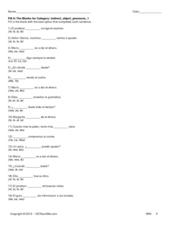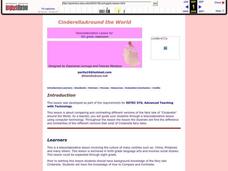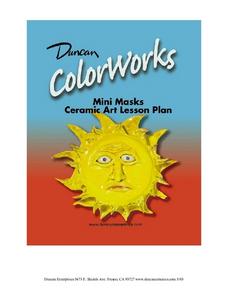Curated OER
Indonesia: Riau Autonomy
Students investigate the economy of the Riau Province of Indonesia. They create a timeline, develop a chart to illustrate the economy, write an editorial about Indonesia's decentralization laws, and participate in a panel discussion.
Curated OER
What's the Weather Like? Primary Level
Elementary schoolers and language learners will shine with a series of games and activities that feature weather words. The exercises can be adapted for pairs, small groups, or whole class participation.
Curated OER
Poetry Workshop: Fixed Form Poems
Encourage the poetic genius in your young creative writers with a poetry workshop. Fix form poems (cinquains acrostic poems, octopoems, hello/goodbye poems) provide a framework and encourage vocabulary development as well as an awareness...
Foreign Policy Research Institute
Defining Democracy and Freedom
This is a simple but effective introduction to democracy. It requires the class to generate working definitions of key terms (provided) and to determine the degree of democracy in various geographic locations today. After they conduct...
Education World
Every Day Edit - Chinese New Year
In this everyday editing worksheet, students correct grammatical mistakes in a short paragraph about the Chinese New Year. The errors range from punctuation, capitalization, grammar, and spelling.
Curated OER
Coming of Age During Japanese Occupation: Richard E. Kim's Lost Names: Scenes from a Korean Boyhood
Explore the implications of the Japanese occupation of Korea during World War II. Learners read Lost Names: Scenes from a Korean Boyhood, participate in classroom discussions about the novel and keep journals in which they respond to...
Curated OER
Indirect Object Pronouns
Build oral fluency by providing your Spanish speakers with this indirect object pronoun instructional activity. There are sixteen questions that require the learner to use the correct indirect object pronoun to complete the sentence....
Curated OER
Development of American Political Parties: The Two-Party System
Was American politics always bound to the two-party system? Learn how the two-party system developed, why third parties tend not to do so well, and all the various political parties that have emerged throughout US history. Each party is...
Global Oneness Project
After the Quake: Preserving the Artifacts of Kathmandu
On April 28, 2015, a 7.8 earthquake ruptured the Kathmandu Valley in Nepal. Seven UNESCO World Heritage sites are located in this valley. The efforts of experts and archeologists to restore three of them—Kathmandu Durbar Square, Patan...
Smithsonian Institution
Korean War
North and South Korea: two regions divided. The story of the Korean War describes the events that occurred when these two regions' ideologies clashed. The resource uses various images and descriptions of artifacts, in addition to...
Stanford University
Chinese Immigration and Exclusion
The Chinese Exclusion Act was the first race-based restriction on immigration in American history. Why was the act passed after Chinese immigrants helped build the Transcontinental Railroad? A series of documents, including speeches and...
Curated OER
Analyzing Japanese Imperialism
Pupils engage in a lesson in order to compare and contrast the Imperialism of Japan to that of the United States and Europe. Students can complete a variety of activities that include research questions, reflection from lecture, and...
Curated OER
Japan
Seventh graders identify some key concepts, ideas, and facts about Japan. Students identify shared traits and differences of Japan as compared to other asian countries. Students identify how geography can affect the culture of a place....
Curated OER
Murder in Ha-Tien: The Concept of Justice in Chinese Society
Eleventh graders become aware of alternative perceptions of reality. They analyze the concept of justice by showing it in an unfamiliar socio- cultural context, inviting comparison. They practice reading comprehension.
Curated OER
Do the Tallywalker
Students study the basics of mapmaking, then make a tally walker, (geographic location device used in secret).
Curated OER
Trade Secrets
Young analysists explore how global trade and free market policies might personally affect them. They read an article, view a series of documenteries, and engage in a class discussion. Great lesson!
Curated OER
The Mekong River
Junior geographers explore the region through which the Mekong flows, its pathway, the landscape, how people depend on the Mekong, and future uncertainties. They apply the five themes of geography to examine the region. They create a...
Curated OER
Cinderella Around the World
Fourth graders compare and contrast different versions of the fairy tale of "Cinderella" around the World. They find the difference and similarities of the different versions that exist of Cinderella fairy tales.
Curated OER
Perceptions of War
Tenth graders share perspectives on war with Iraq with students from various countries, and write position papers expressing specific stance on issues.
Curated OER
Rights and Responsibilities: Grass Born to Be Stepped On
Students research an event in history in which rights and responsibilities are involved. They create a movie of the information they find.
Curated OER
Mini Masks: Ceramics
Masks have been used for many reasons throughout human history. They are also great subjects for art projects! Included here are instructions, background information, and all the supplies needed to create mini masks in your class.
Curated OER
On the Road with Marco Polo: From Hormuz to Venice
Students study the route from Hormuz to Constantinople that was traveled by the Polos. They explain the importance of Constantinople in medieval time and discuss its location, and outer wall structure.
National Endowment for the Humanities
Lesson 1: On the Road with Marco Polo: A Boy in 13th Century Venice
Learners investigate Marco Polo's life as a young boy in 13th century Venice. They analyze maps, explore various websites, complete a chart and answer discussion questions, and create a travel brochure about visiting 13th century Venice.
Curated OER
Lions, Dragons, and Nian: Animals of the Chinese New Year
Students examine the major differences between earstern and western dragons and their association with the Chinese New Year. They view and discuss a video, read New Year poems, explore various websites, and create a lion mask.
Other popular searches
- China's Geography
- China's National Theater
- China's Little Ambassador
- China's Government
- China's Economy
- China's Food and Culture
- China's One Child Policy
- China,s Class Structure
- China's Economic Development
- China's River Valleys
- China's Ethnic Groups
- Chinas Class Structure

























